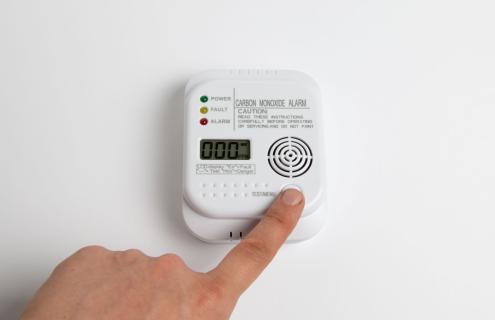
Each year, more than 400 Americans die from unintentional CO poisoning not linked to fires, more than 20,000 visit the emergency room, and more than 4,000 are hospitalized.
James E. Esdon, program coordinator, Dartmouth Health Children’s Injury Prevention CenterAs New England gears up for even more snow, it’s an important opportunity to remind people about the dangers of carbon monoxide (CO) poisoning. CO is an odorless, tasteless gas which can result from faulty heating appliances, cars left running in garages, and the use of generators during power outages.
“CO can build up indoors and poison people and animals who breathe it,” said James E. Esdon, program coordinator for Dartmouth Health Children’s Injury Prevention Center. “Each year, more than 400 Americans die from unintentional CO poisoning not linked to fires, more than 20,000 visit the emergency room, and more than 4,000 are hospitalized.”
The Injury Prevention Center offers the following tips to both prevent and identify CO in the home:
- Make sure your home has a CO alarm on every level, especially near sleeping areas, and keep them at least 15 feet away from fuel burning appliances, like wood stoves.
- If you need to warm a vehicle, remove it from the garage immediately after starting it. Don't leave a car or motorcycle engine running inside a garage, even if the garage doors are open. If you own a hybrid vehicle and you keep it in a garage, double check that your car is off. CO poisonings have occurred from hybrids that have the gasoline portion of the engine turned on and then fill the garage and home with CO.
- Check your furnace exhaust vents on the outside of your home to make sure they are clear of snow or any obstruction.
- Never use your stovetop or gas oven to heat your home.
- Do not use a grill, generator or camping stove inside your home, garage or near a window.
- Use generators and any gas-powered equipment outside, at least 20 feet away from doors, windows, and vents.
- On the outside of your home, make sure vents for the dryer, furnace, stove and fireplace are clear of snow and debris.
- Wood pellets give off carbon monoxide and should never be stored in a dwelling or enclosed location. Stored pellets can create a large amount of CO poison.
- If your CO alarm sounds, immediately move outdoors or to an open window or door for fresh air and be sure to account for everyone in your home. Call 911 and remain outside or by the open window until emergency personnel arrive to assist you.
- The most common symptoms of CO poisoning are headache, dizziness, weakness, upset stomach, vomiting, chest pain, and confusion. CO symptoms are often described as flu-like but without the fever. “It’s important to know that children process carbon monoxide differently than adults and they can be more severely affected by it and may show signs of poisoning sooner,” Esdon said.
For more information about CO poisoning and prevention, contact the Injury Prevention Center at 603-308-2253.
About CHaD
As New Hampshire's only full-service, comprehensive children's hospital, the Children’s Hospital at Dartmouth‐Hitchcock (CHaD) is committed to providing outstanding compassionate care for children and their families. Their physician expertise provides primary, specialty, and tertiary care to the children of New Hampshire, Vermont, and beyond. CHaD offers inpatient (hospital care) and outpatient (same day care) services at Dartmouth‐Hitchcock Medical Center in Lebanon, NH. Outpatient and same-day surgery services are available at Dartmouth‐Hitchcock Manchester. Primary care is available at Dartmouth‐Hitchcock facilities in Bedford, Concord, Keene, Lebanon, Manchester, and Nashua, NH, and Bennington, VT. For more information about CHaD, please visit childrens.dartmouth-health.org or contact us at 603-650‐KIDS or chad.community.relations@hitchcock.org.